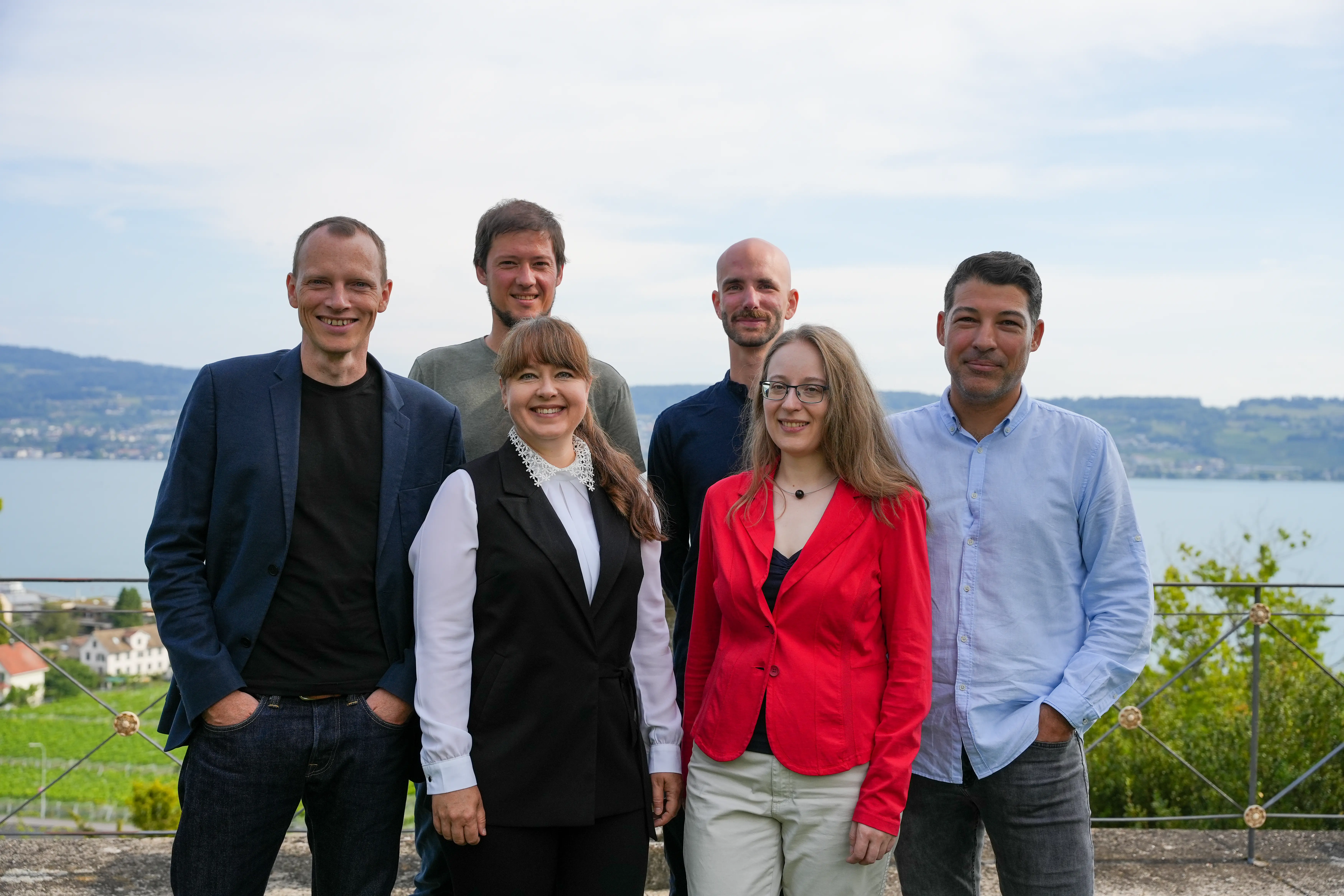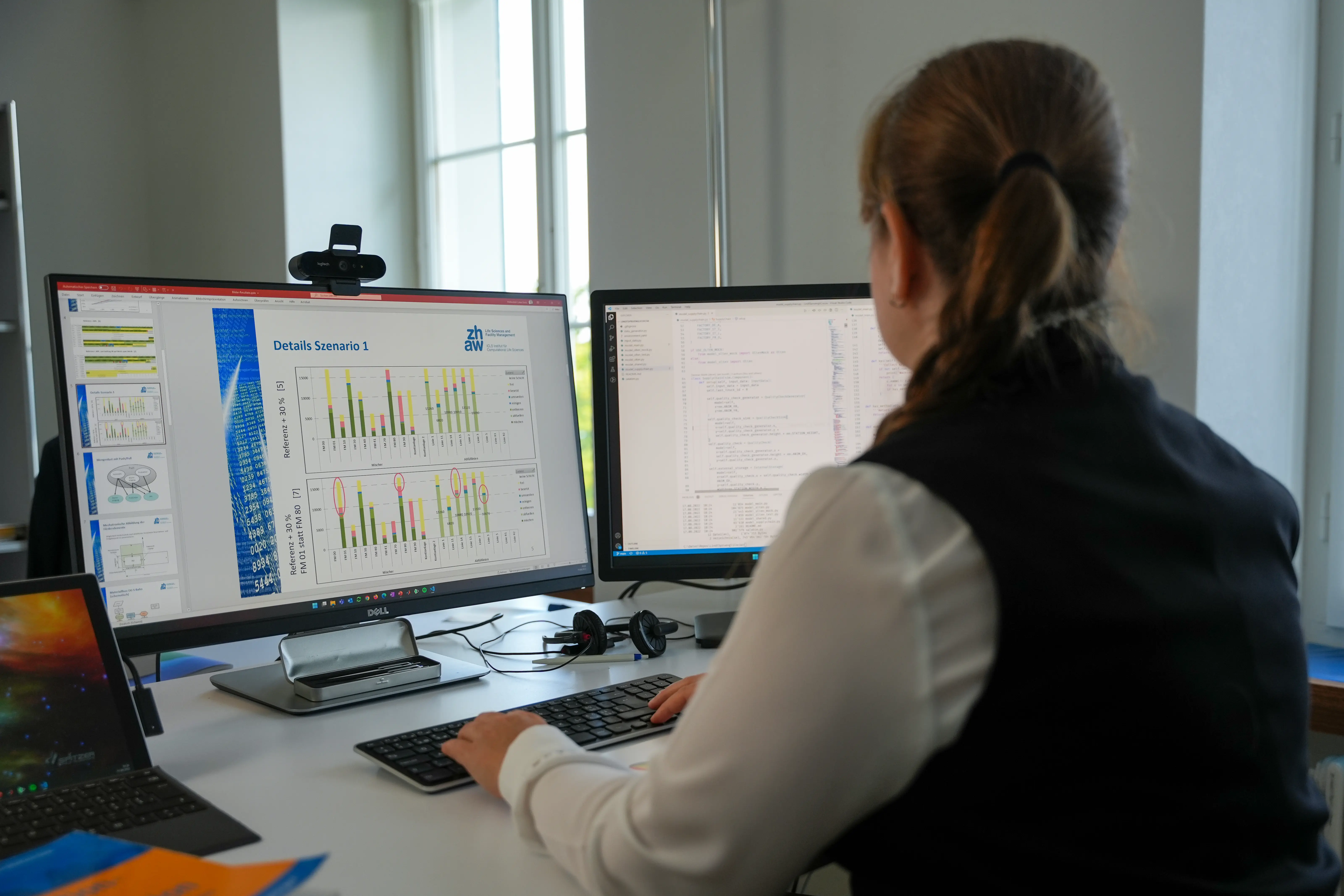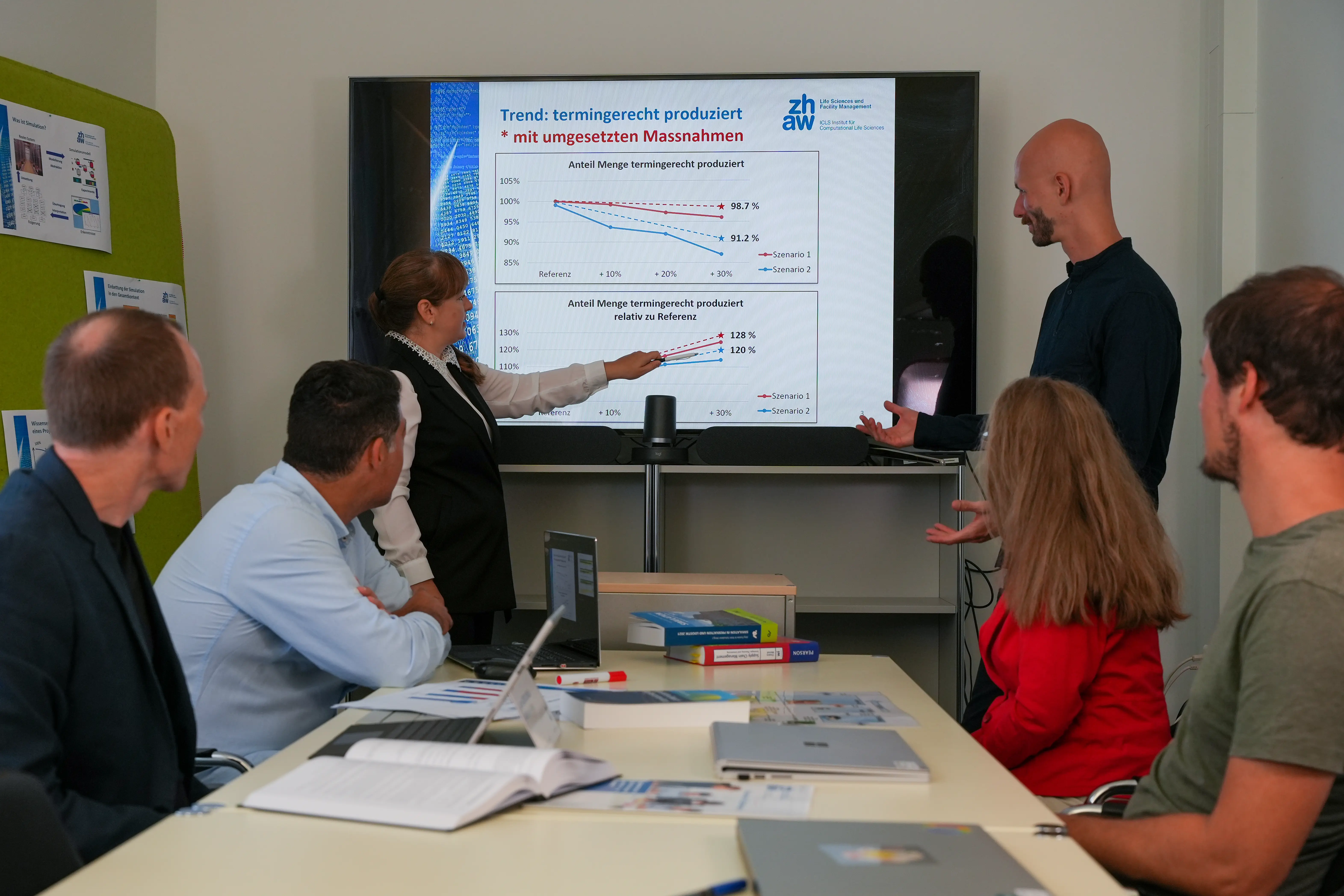Simulation & Optimization Research Group

Why we simulate
Markets, company structures and processes are not only complex, but are also changing ever more rapidly. Shorter cycles require rapid redesign and adjustment of internal and external structures and dependencies.
Our applied research transfers the newest methods from theory to practice. This enables us to develop individual and innovative solutions with our partners.
We enable you to recognize potential for rationalization and quantify it more effectively. We also help you achieve better understanding and control of dynamic and complex processes. Your planning quality improves significantly as we support you in asking the correct questions.
Thanks to user-friendly simulation tools, you can easily change your system parameters whenever necessary. In this way you adopt the best possible solution to your problem efficiently and without risk.
Motivation

We all want to
- use resources efficiently
- avoid risks
- disentangle processes
- understand dependencies
- work out quantified (and qualified) bases for decisions
«We achieve your goals innovatively and sustainably at the interface of research and practice.»
Vorgehen

We support you by
- analyzing your complex processes and systems
- reducing intricate relationships to the essentials
- developing dynamic models
- visualizing processes
- using optimization methods
«We solve complex problems through simulation and optimization.»
Benefits

Your benefits from our projects:
- analysis of your current situation and recommendations for action
- simulation models to quantitatively support your decisions
- visualizations for a better understanding of processes
- tools to support strategic and operational planning and innovative solutions
«We experiment with you in the simulator to find a predictable and economically viable reality.»
Projects
Since 1991, the research group has implemented more than 300 projects in the fields of plant and mechanical engineering, the food and chemical industries, hospital logistics and medical technology, road and air traffic, people flow, services and the military. We are proud to present some of our reference projects.
-
Digital Twin for Production Planning and Control in Variant-Rich Series Production (TwinPlan)
Digital Innovation to Improve On-Time Delivery: Schmid Elektronik AG faces the challenge of improving on-time delivery despite a high product variety and customer-specific small series. To address these challenges, the company is implementing a digital planning twin designed to accurately forecast…
expired, 05/2024 - 10/2024
-
End-to-End Data Driven Design of After-Sales-Services for Digital Cutters
expired, 04/2022 - 09/2024
-
Reinforcement Learning Analysis Framework
The aim of this project is to implement a framework that facilitates the development of RL solutions for real-world applications. This is necessary since the academic literature usually focuses on specific algorithms and approaches differ widely for different regions in the highly complex RL problem…
expired, 01/2022 - 12/2022
-
Simulation-based comparison of an end-to-end and a platform configuration for injection molding line
The project partner received two layout proposals for a new production line and wanted to compare them in terms of their suitability and performance. In the injection molding process, failure of individual injection molding cavities can occur, which leads to systematic or random missing parts. The…
expired, 09/2021 - 12/2021
-
PE(K)O Sustain – Physically modified oils as sustainable alternative to tropical fats for the baking and sweet goods industry
Palmoil replacement in baked and sweet goods
expired, 08/2021 - 07/2024
-
Designing Business Models for the IoT
This project aims at developing a business model simulation software for evaluating IoT business models. The holistic approach leverages advanced simulation methods and will create new revenue opportunities for Swiss manufacturing companies.
expired, 01/2021 - 07/2022
-
Digital Simulation of the Swiss Vaccination Center Winterthur
Creation of a virtual twin to optimize processes
expired, 01/2021 - 12/2021
-
A top-down indicator of lean-green alignment in small and medium-sized enterprises
To address the challenge from global warming, the UNFCCC has given rise to several initiatives to channel financial capital into decarbonization efforts. Among investors, demand increasing for investment vehicles that offer both environmental sustainability as well as economic performance benefits.…
expired, 01/2021 - 11/2021
-
Predicitve Waste Management for SBB Train Stations
We develop a system to optimize the waste collection and disposal on SBB's train stations. The new system will use a container fill level sensor network, a novel waste accumulation forecasting algorithm, and state of the art methods for simulation-based tour-planning.
expired, 09/2020 - 01/2022
-
Data-driven decision support for intracranial aneurysms and hospital catering using Bayesian networks
Clinical decisions in medicine and management decisions in facility management are regularly made on the basis of little evidence or extrapolations and are also influenced by subjective and economic aspects. While data is generated exponentially in medicine due to increasing digitization, there is…
expired, 03/2020 - 12/2021
-
Simulation of pedestrian and traffic flows
expired, 09/2019 - 09/2020
-
Fighting bites with bytes: Promoting public health with crowdsourced tick prevention
Ticks are on the rise and transmit several infectious diseases, leading to serious illness or even death. The smartphone App “Zecke–Tick Prevention helps people, to remember the tick bite location and to check it for potential Lyme disease symptoms. In an interdisciplinary approach, ZHAW-scientists…
expired, 07/2019 - 12/2021
-
Simulation & Optimization needs HPC
The simulation and optimization is predestined for high performance computing (HPC). Many computing operations are necessary and huge amounts of data are being generated. The requirements have also increased in recent years as the models become more complex. In addition, simulation-based…
expired, 11/2017 - 12/2019
-
Generic Simulation and Scheduling Tool for Powder Spray Coating Facilities
Reducing energy consumption, operation costs and investment risk. Using and utilizing painting lines in an optimal way. Safeguard investments in new and existing facilities.
expired, 08/2015 - 12/2017
-
Scheduling & Simulation USM
Highly specific production planning based on simulation-optimization
expired, 07/2015 - 07/2018
-
Cooperational platform for urban logictis: An economically and ecologically efficient business model for the city of Zürich and other…
expired, 05/2014 - 03/2016
-
Logistics and process simulation and optimization of a new office building
Simulation of traffic and people flow for a planned building complex. Simulation of the distribution of goods in several buildings taking into account high security standards in the area of access control.
expired, 03/2011 - 12/2011
-
Simulation as planning, configuration and optimiziation tool for automating production processes.
Process planning, automation and optimization with logistics and process simulation
expired, 04/2008 - 12/2008
-
Jukebox – Simulation of a highly dynamic transport and storage system
Dynamic connection and optimization of a novel system component in a fully automated transport and storage system: / Simulation of a highly dynamic transport and storage system / Development and testing of the control strategies and verification of the requirement profile for the transport units…
expired, 04/2008 - 12/2008
Current publications
-
Starostina, Tatiana; Hollenstein, Lukas,
2019.
Logistik mit Simulation sicher planen und optimieren.
Lebensmittel-Industrie: Fachmagazin für das Management der Nahrungsmittel- und Getränkeindustrie.
2019(11/12), pp. 14-15.
Available from: https://doi.org/10.21256/zhaw-20245
-
Michelucci, Umberto,
2019.
Advanced applied deep learning : convolutional neural networks and object detection.
1st edition.
Berkeley:
Apress.
ISBN 978-1-4842-4975-8.
-
Hollenstein, Lukas; Lötscher, Adrian; Luccarini, Fabian,
2019.
SimLack : simulation-based optimization and scheduling of generic powder coating lines.
Simulation Notes Europe.
29(3), pp. 127-132.
Available from: https://doi.org/10.11128/sne.29.tn.10483
-
Hollenstein, Lukas; Lichtensteiger, Lukas; Stadelmann, Thilo; Amirian, Mohammadreza; Budde, Lukas; Meierhofer, Jürg; Füchslin, Rudolf Marcel; Friedli, Thomas,
2019.
Unsupervised learning and simulation for complexity management in business operations.
In:
Braschler, Martin; Stadelmann, Thilo; Stockinger, Kurt, eds.,
Applied data science : lessons learned for the data-driven business.
Cham:
Springer.
pp. 313-331.
Available from: https://doi.org/10.1007/978-3-030-11821-1_17
-
Lötscher, Adrian,
2018.
Methoden und Trends für eine nachhaltige Lebensmittellogistik.
In:
SGLWT Mitgliederversammlung 2018, Wädenswil, 13. April 2018.